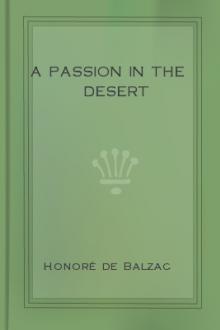Genre Fiction. Page - 194

as at sea on aclear day, with one line of light, definite as the cut of a sword.
The Provencal threw his arms round the trunk of one of the palm trees,as though it were the body of a friend, and then, in the shelter ofthe thin, straight shadow that the palm cast upon the granite, hewept. Then sitting down he remained as he was, contemplating withprofound sadness the implacable scene, which was all he had to lookupon. He cried aloud, to measure the solitude. His voice, lost in thehollows of the hill, sounded faintly, and aroused no echo--the echowas in his own heart. The Provencal was twenty-two years old:--heloaded his carbine.
"There'll be time enough," he said to himself, laying on the groundthe weapon which alone could bring him deliverance.
Viewing alternately the dark expanse of the desert and the blueexpanse of the sky, the soldier dreamed of France--he smelled withdelight the gutters of Paris--he remembered the towns through which hehad passed, the faces of his comrades, the most

ns of theprolix document. Five clerks with rows of hungry teeth, bright,mocking eyes, and curly heads, lifted their noses towards the door,after crying all together in a singing tone, "Come in!"
Boucard kept his face buried in a pile of papers--/broutilles/ (oddsand ends) in French law jargon--and went on drawing out the bill ofcosts on which he was busy.
The office was a large room furnished with the traditional stool whichis to be seen in all these dens of law-quibbling. The stove-pipecrossed the room diagonally to the chimney of a bricked-up fireplace;on the marble chimney-piece were several chunks of bread, triangles ofBrie cheese, pork cutlets, glasses, bottles, and the head clerk's cupof chocolate. The smell of these dainties blended so completely withthat of the immoderately overheated stove and the odor peculiar tooffices and old papers, that the trail of a fox would not have beenperceptible. The floor was covered with mud and snow, brought in bythe clerks. Near the window stood th

ing thething to pass by his own dogged efforts. Men fell into the habit ofcalling him Luck, and they forgot that he had any other name; so thereyou have it, straight and easily understandable.
As luck would have it, then,--and no pun intended, please,--he foundhimself en route to Dry Lake without any trouble at all; a mere matter ofone change of trains and very close connections, the conductor told him.So Luck went out and found a chair on the observation platform, and gavehimself up to his cigar and to contemplation of the country they weregliding through. What he would find at Dry Lake to make the stop worthhis while did not worry him; he left that to the future and to the godChance whom he professed to serve. He was doing his part; he was goingthere to find out what the place held for him. If it held nothing but ahalf dozen ex-cow-punchers hopelessly tamed and turned farmers, why,there would probably be a train to carry him further in his quest. Hewould drop down into Wyoming and Arizona a

certain she, sometimes at least, must say whatis worth hearing about such matters."
"Well, but she's an exception. Besides, she hasn't any children."
"Then," said my husband, "there's Lady Bernard"--
"Ah! but she was like no one else. Besides, she is almost a publiccharacter, and any thing said about her would betray my original."
"It would be no matter. She is beyond caring for that now; and not one ofher friends could object to any thing you who loved her so much would sayabout her."
The mention of this lady seemed to put some strength into me. I felt as ifI did know something worth telling, and I was silent in my turn.
"Certainly," Mr. S. resumed, "whatever is worth talking about is worthwriting about,--though not perhaps in the way it is talked about. Besides,Mrs. Percivale, my clients want to know more about your sisters, and littleTheodora, or Dorothea, or--what was her name in the book?"
The end of it was, that I agreed to try to the extent of a dozen pages orso.

ed another door, which ushered him at once into a very large hall, the aspect of which quite bewildered him. There were a great many desks and tables about the hall, with clerks writing at them, and people coming and going with passports and permits in their hands. Rollo stepped forward into the room, surveying the scene with great curiosity and wonder, when his attention was suddenly arrested by the voice of a soldier, who rose suddenly from his chair, and said,--
"Your cap, young gentleman."
Rollo immediately recollected that he had his cap on, while all the other people in the room were uncovered. He took his cap off at once, saying to the soldier at the same time, "Pardon, sir," which is the French mode of making an apology in such cases. The soldier then resumed his seat, and Rollo and Carlos walked on slowly up the hall.
Nobody took any notice of them. In fact, every one seemed busy with his own concerns, except that in one part of the room there were several benches where a number

get killed, in advance, you will learn the same thing in the same way I learned it. Where are your blamed batteries?"
"Bill, you are all right."
"I am, am I?"
"First help me enter these way-bills and check up the express packages so I can deliver them to this mob."
"My business isn't checking up express; but I like you, young fellow, so, go ahead. Only you talk too much."
"Just a moment!"
At these words coming from the other end of the office, the lineman and the operator looked around. The military-looking man and his companion had entered the room unobserved and stood at the counter listening to the colloquy between the Eastern boy and the plainsman--for neither of the two were more than boys. Dancing saluted the new-comers. "It's Colonel Stanley and Bob Scott," he exclaimed.
Bucks walked forward. Stanley handed him a message. "You are the night operator? Here is a despatch for General Park. Get it out for me right away, will you?"
Dancing came forwar

it too mooch col' in wintaire, but, voila! Better A'm lak I freeze l'il bit as burn oop!"
The Texan laughed. "I don't blame you none. I never be'n down to Yuma but they tell me it's hell on wheels. Go ahead an' deal, Pedro."
"Pedro, non! Ma moder she nam' Moon Eye, an' ma fader she Cross-Cut Lajune. Derefor', A'm Batiste Xavier Jean Jacques de Beaumont Lajune."
The bottle thumped upon the table top.
"What the hell is that, a name or a song?"
"Me, das ma nam'--A'm call Batiste Xavier Jean----"
"Hold on there! If your ma or pa, or whichever one done the namin' didn't have no expurgated dictionary handy mebbe they ain't to blame--but from now on, between you an' me, you're Bat. That's name enough, an' the John Jack Judas Iscariot an' General Jackson part goes in the discards. An' bein' as this here is only a two-handed game, the discards is dead---- See?"
At the end of an hour the half-breed watched with a grin as the Texan raked in a huge pile o

ated bedstead lay an old manwho seemed to be at death's door; his eyes were sunk, his breathhurried, his lips trembling. By the side of his bed stood an earthenlamp upon a fragment of brick taken from the ruins of the house. In itthe oil was deficient; so also was it in the body of the man. Anotherlamp shone by the bedside--a girl of faultlessly fair face, of soft,starry beauty.
Whether because the light from the oil-less lamp was dim, or becausethe two occupants of the house were absorbed in thinking of theirapproaching separation, Nagendra's entrance was unseen. Standing inthe doorway, he heard the last sorrowful words that issued from themouth of the old man. These two, the old man and the young girl, werefriendless in this densely-peopled world. Once they had had wealth,relatives, men and maid servants--abundance of all kinds; but by thefickleness of fortune, one after another, all had gone. The mother ofthe family, seeing the faces of her son and daughter daily fading likethe dew-drench

know, I know! That will do-o-o, that will do-o-o!" cooed theWood-Pigeon obstinately in her soft, foolish little voice, withoutpaying the least attention to Mother Magpie's directions.
"We all know that--anything more?" chirped the chorus of birds, tryingto conceal how anxious they were to know what came next, for the nestswere only half finished.
But Mother Magpie was thoroughly disgusted, and refused to go on withthe lesson which had been so rudely interrupted by her pupils.
"You are all so wise, friends," she said, "that surely you do not needany help from me. You say you know all about it,--then go on and finishyour nests by yourselves. Much luck may you have!" And away she flew toher own cosy nest in the elm tree, where she was soon fast asleep,forgetting all about the matter.
But oh! What a pickle the other birds were in! The lesson was but halffinished, and most of them had not the slightest idea what to do next.That is why to this day many of the birds have never learned to buil

back to London. I cannot say that we were sorry.
For, let us be candid. I could be classed as a selfish, and unpatriotic old curmudgeon, but when we have cut the sentimental cackle, one has to confess that you cannot mix classes that are as different as chalk and cheese. These women from the East End were much less clean than animals, and far less likeable. They were lazy lumps of flesh, coarse, vulgar, noisy, ignorant. You could hear their hideous voices and their obscene laughter all over the house. And you could smell them. Blame our social scheme, if it pleases you, but the fact was incontestable, they were no better than unclean savages in our lovely house.
I think it must have been in August that I received my first warning. I had gone shopping in Melford, and I met Gibson in the ironmongers. He was looking worried and cross.
"Been requisitioned yet?"
"Requisitioned?"
"They are taking my place over next week. I expect you will be."
I think I gaped at him.